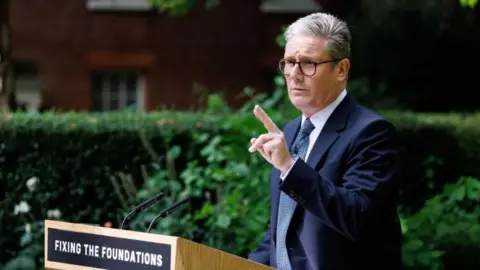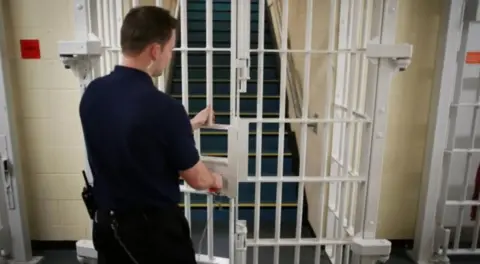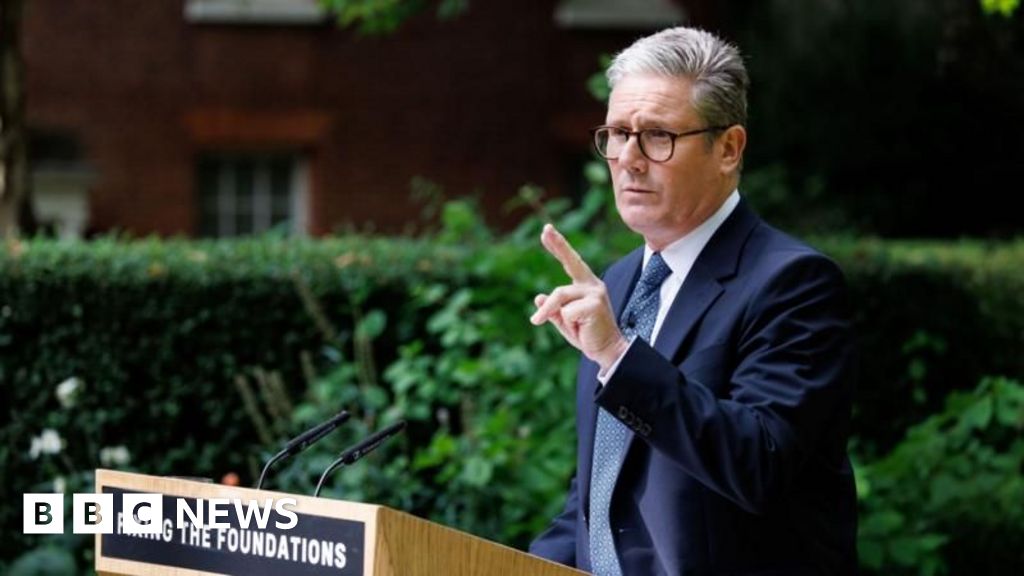 EPA
EPAPrime Minister Sir Keir Starmer has warned that “things will get worse before they get better”.
He has been hammering home the argument that the Labour Party has taken over from the Conservatives at a time when the government is short of money, and public services such as health and prisons are in a mess.
He is claiming things are worse than he and his party knew before they won the election – so they will have to do things to fix them which they didn’t warn about before people voted.
The Conservatives say that Labour has planned to raise taxes all along.
How did we get to this point?
The PM’s speech didn’t spell out exactly what bad news could be coming, but it did warn of a “painful” budget on 30 October.
This is when the government will announce its plans for taxation and spending over the coming year.
The government is definitely short of money. This is partly the result of weak economic growth in recent years, which has meant companies are making lower profits, and people’s earnings are growing more slowly.
That means the taxes the government collects on wages, profits and purchases have also been growing more slowly.
At the same time, an ageing society has placed a greater burden on public services such as the NHS.
The government’s spending watchdog, the Office for Budget Responsibility, has also said that the decision to leave the European Union has slowed economic growth.
But Labour argues that things are even worse than they seemed before the election. The prime minister has warned of a so-called “black hole” in the public finances.
All of the above rhetoric on the state of the economy might be used in attempts to justify any decisions to raise taxes or other measures which were not set out during the election campaign.
What does ‘getting worse’ actually mean?
In his speech on Tuesday, Sir Keir set out a number of areas where he says the country is not working well such as NHS waiting lists, a lack of capacity in prisons and sewage discharges by water companies.
He is warning that these problems will not be resolved quickly.
But he is also warning that fixing those and other problems will cost money.
That could mean a combination of tax rises and spending cuts. In the prime minister’s words, it will be “painful”.
However, it is not inevitable that the next Budget has to be, or will be, painful.
Labour’s decision to settle industrial action by giving public sector workers pay rises, and to limit the amount of money the government borrows, has increased the pressure on the public finances.
There is also a clear political strategy at work here, with Labour looking to heap as much blame as possible for unpopular decisions on the previous government while they are new in power.
 PA Media
PA MediaIs there really a ‘black hole’ in the public finances?
The phrase “black hole” often appears in discussions about government and money, and it means different things.
In this case, Chancellor Rachel Reeves and the prime minister are talking about a gap between what government departments, such as health and education, expected to spend this year versus what they will actually end up spending.
This gap was first mentioned by Ms Reeves in July, when she said the government was overspending by £22bn – and claimed it had been “covered up” by the Conservatives before the election.
Shadow chancellor Jeremy Hunt has meanwhile accused Ms Reeves of an “utterly bogus attempt to hoodwink the public”.
There is a debate about how much of a surprise this was. About £9bn of the £22bn is the cost of increasing public sector pay above the 2% which had been budgeted for – a choice which has been made by this new government.
Paul Johnson, the director of the Institute for Fiscal Studies thinktank, has argued that the need to give higher public sector pay rises could easily have been foreseen.
But other items which make up the £22bn were more genuine surprises, he says, including that it was not clear that reserve money seemingly expected to cover higher spending on the asylum system had already been, in effect, spent elsewhere.
He and other experts have argued that neither Tories nor Labour were straightforward with the public during the election campaign about how bad the public finances were, and what unpopular measures are required to fix it.
How would a government fill a ‘black hole’?
Governments faced with a gap between what they plan to spend and what they expect to raise in taxes face a choice.
They could cut spending, raise taxes, or cover the gap by borrowing money, however, the new Labour government has chosen to impose a limit on how much it can continue borrowing.
It says that the total size of the national debt (relative to the size of the economy) has to be projected to fall in five years’ time. This is the same limit as the previous Conservative government set itself under what are known as “fiscal rules”.
Fiscal rules are self-imposed by governments in most rich countries to maintain credibility with financial markets.
The government is very close to breaking this rule. Latest figures suggest it is within £9bn of that limit – which is next to nothing given the scale of government spending.
Ms Reeves has very little scope to raise borrowing and stick within this target. So it is likely that she will raise taxes and announce some spending cuts in the forthcoming Budget.
Which taxes will go up?
The chancellor has said more about what taxes will not be going up – that includes the four taxes which raise the most: income tax, National Insurance, VAT, and corporation tax, which are charged on company profits.
Labour promised not to raise taxes on “working people”, and that those with the “broadest shoulders” (i.e. wealthy people) should bear the burden.
In ruling out raising the biggest taxes, Labour has limited its room to manoeuvre when it comes to raising more money.
Some tax rises have been announced – such as a decision to charge VAT on private school fees. But the amounts raised would fall short of what will be needed to cover the gap.
Some options which have not been ruled out include increasing taxation of pensions, capital gains (a tax on profits made when a person sells an asset), or inheritance tax.
A number of independent experts have argued that the fiscal rules are not the best way to set out a path for government spending, and that the measures the government has to do to meet them are not necessarily the best decisions.


